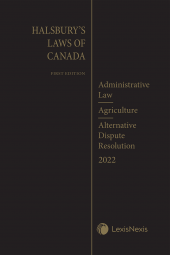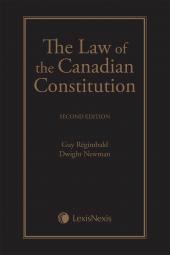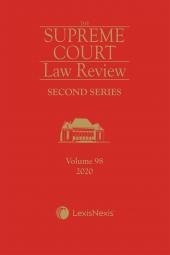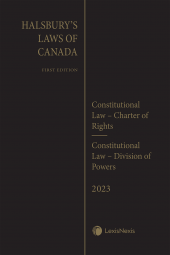Halsbury's Laws of Canada – Constitutional Law – Charter of Rights (2023 Reissue) / Constitutional Law – Division of Powers (2023 Reissue)
One Year Subscription Only Terms
Subscribers receive the product(s) listed on the Order Form and any Updates made available during the annual subscription period. Shipping and handling fees are not included in the annual price.
Subscribers are advised of the number of Updates that were made to the particular publication the prior year. The number of Updates may vary due to developments in the law and other publishing issues, but subscribers may use this as a rough estimate of future shipments. Subscribers may call Customer Support at 800-833-9844 for additional information.
Subscribers may cancel this subscription by: calling Customer Support at 800-833-9844; emailing customer.support@lexisnexis.com; or returning the invoice marked 'CANCEL'.
If subscribers cancel within 30 days after the product is ordered or received and return the product at their expense, then they will receive a full credit of the price for the annual subscription.
If subscribers cancel between 31 and 60 days after the invoice date and return the product at their expense, then they will receive a 5/6th credit of the price for the annual subscription. No credit will be given for cancellations more than 60 days after the invoice date. To receive any credit, subscriber must return all product(s) shipped during the year at their expense within the applicable cancellation period listed above.
Détails des produits
Begin updating your law library today!
$148* per volume (ISBN: 9780433454946) OR purchase individual volumes at $335 each.
For more information or to place an order please contact us.
*Per volume with commitment to purchase the entire 72-volume set.
------------------------------------------------------------------------------------
CONSTITUTIONAL LAW – CHARTER OF RIGHTS
Dwight Newman, K.C., B.A., M.A.T.S., J.D., M.Sc., B.C.L., M.Phil., D.Phil.
The impact of the Canadian Charter of Rights and Freedoms on virtually every field of law is beyond debate, as is the importance of an authoritative resource that lawyers can turn to for a clear explanation of its application and interpretation.
Constitutional Law – Charter of Rights discusses the scope and application of the Charter, and its interpretation by Canadian courts.
Topics covered include:
- Interactions with the Canadian Bill of Rights
- Principles of interpretation
- Application to government action and extraterritorial application
- Limitation of rights
- Section 33 constitutional override
- Rights and freedoms protected
- Enforcement of Charter rights and remedies
CONSTITUTIONAL LAW – DIVISION OF POWERS
Guy Régimbald, B.S.Sc., LL.B., B.C.L. (Oxon.) & John J. Wilson, B.A (Hons.), J.D., B.C.L.
Canada's constitution creates two distinct levels of legislative authority. It is therefore of critical importance to know which subject areas are within the exclusive jurisdiction of Parliament, which are strictly matters for the provincial legislatures, and which are areas of both federal and provincial jurisdiction.
Constitutional Law – Division of Powers illuminates the complex interaction between the written and unwritten elements of the constitution, together with the common law and practices, customs and conventions that have shaped our modern legal system.
Topics covered include:
- Sources of constitutional law and institutions
- Constitutional conventions and unwritten principles of the constitution
- Courts, independence of the judiciary and judicial review
- Constitutional interpretation
- Peace, order and good government
- Criminal law – federal and provincial jurisdiction
- The regulation of trade and commerce
- The raising of revenue, the spending power and federal authority in relation to banking, bankruptcy and interest
- Works and undertakings, communications and transportation, and labour relations
- Property and civil rights and provincial authority in relation to local and private matters
Table des matières
Constitutional Law – Charter of Rights
I. Introduction
II. Application of the Charter
III. Limitation of Rights
IV. Section 33 Notwithstanding Clause
V. Democratic Rights
VI. Fundamental Freedoms
VII. Mobility Rights
VIII. Section 7: Life, Liberty and Security of the Person
IX. Legal Rights: Sections 8 to 14
X. Equality Rights
XI. Language Rights
XII. Enforcement of Charter Rights and Remedies
Constitutional Law – Division of Powers
I. Sources of Constitutional Law and Institutions
II. Constitutional Conventions and the Unwritten Principles of the Constitution
III. Courts, Independence of Judiciary and Judicial Review
IV. Constitutional Interpretation: Pith and Substance, Double Aspect, Paramountcy and Interjurisdictional Immunity
V. Peace, Order and Good Government
VI. Criminal Law – Federal and Provincial Jurisdiction
VII. The Regulation of Trade and Commerce
VIII. The Raising of Revenue, the Spending Power and Federal Authority Over Banking, Bankruptcy and Interest
IX. Works and Undertakings, Communications and Transportation, and Labour Relations
X. Property and Civil Rights and Provincial Authority in Relation to Local and Private Matters
XI. The Environment and Natural Resources
Produits liés
-
 Halsbury's Laws of Canada – Administrative Law (2022 Reissue) / Agriculture (2022 Reissue) / Alternative Dispute Resolution (2022 Reissue)Date de sortie: July 29, 2022335,00 $
Halsbury's Laws of Canada – Administrative Law (2022 Reissue) / Agriculture (2022 Reissue) / Alternative Dispute Resolution (2022 Reissue)Date de sortie: July 29, 2022335,00 $ -
 The Law of the Canadian Constitution, 2nd EditionDate de sortie: June 16, 2017420,00 $
The Law of the Canadian Constitution, 2nd EditionDate de sortie: June 16, 2017420,00 $ -
 Supreme Court Law Review, 2nd Series, Volume 98Date de sortie: October 20, 2020325,00 $
Supreme Court Law Review, 2nd Series, Volume 98Date de sortie: October 20, 2020325,00 $
 Lexis Nexis
Lexis Nexis 